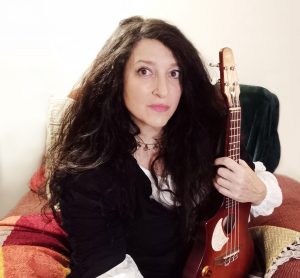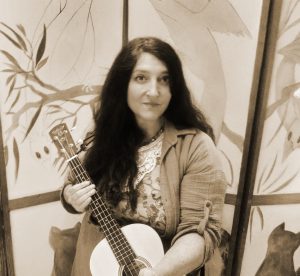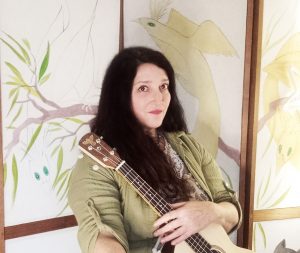Elena Duff
 Irish songwriter, visual artist, and music producer Elena Duff will be performing at the Your Roots Are Showing Festival this week.
Irish songwriter, visual artist, and music producer Elena Duff will be performing at the Your Roots Are Showing Festival this week.
What are your roots?
I’m Irish but happened to be born in London and also lived in Spain as a child for a few years before we settled back in Dublin.
Where do you currently reside?
I’m currently living in County Cavan in Ireland. It’s in the north-centre of the country and borders on Northern Ireland. It’s a very rural location full of green fields, cows, sheep, with plenty of rain. It also boasts 366 lakes – one for every day of the year (and one to spare!)
When and why did you become interested in music?
I’ve always had a passion for music going back as far as I can remember. Music was a big feature of my house with my mother always listening to the radio, as well as playing jazz, classical or swing music records and singing snippets of songs as she went about her day. She’d often bring me to musicals, or events like flamenco guitar recitals. My cousins were also music-obsessed and my early childhood with them was spent steeped in David Bowie, Steely Dan, Led Zeppelin and more. I remember for my 11th birthday my biggest desire was an album. My cousins bought me The Best of Blondie (a now very tattered album which I still have today!).
Are they the same reasons you do it today?
The passion for music is still there, but I never dreamed it’d be something that I could do. I had taken classical guitar lessons for a few months in my late teens, and was good at it, but struggled reading music and when I started art college it sucked up all my creative headspace, so I wrote off my ability to play guitar and decided I was not very good at it. From then on I lived my life as a music-appreciator and visual artist until one day, on a whim, many years later I bought a ukulele. That first humble little €25 ukulele changed my life. The chord shapes were more or less the same as the few I knew on guitar, and I soon became completely obsessed with learning more. I watched hours of tutorials online, learned songs and tentatively started to sing. Soon I was putting covers on YouTube and a Korean ukulele manufacturer saw them and asked me to endorse their instrument. It slowly started to dawn on me that “I might actually be good at this”. I then, confidence renewed, bought a steel-string acoustic guitar and learned to play acoustic rhythm guitar. Honestly, just being able to conjure up songs from thin air and make music with a bit of wood, some strings and my own voice still feels like some kind of witchcraft to me and still brings the same joy now as it did when I first picked up that cheap ukulele a few years ago.
What are the challenges involved with the vocation?
I think most musicians would agree that in the current time we’re in that the main challenge of being a musician is financing a music career due to the changes brought about from the Internet and streaming services. It means there is also far more competition with thousands upon thousands of new songs uploaded to streaming services every day (although, of course, on the flip side there is also more opportunity as everyone who wants to is given a shot to release their music). There is also now the expectation now that music should be free, that it isn’t something you pay for in order to listen to it. The advice for musicians is that they should give away the recordings that they’ve spent a lot of money, expertise and time perfecting in the hope that the songs get discovered. This leaves musicians scrambling to find other ways, outside of selling the music, to earn a living. Having to focus on earning money from everything but selling your actual records takes time away from the actual creative process of music-making, and the whole situation has left many people, both well-known artists and lesser-known in a precarious financial situation.
What are the rewards?
For me personally, music combines a few of the things in life that I love doing, writing for song writing, playing and singing for composing melodies and arrangements and then I get to use my visual arts background in video creation and song artwork. Music also – whether at a professional or amateur level – brings people from extremely different backgrounds together, who would otherwise never meet which keeps you open-minded and makes life interesting. It’s also extremely rewarding when someone tells you that a song of yours has touched them in some way, or made them feel a certain emotion. To know you’ve connected with someone who you don’t even know, sometimes on the other side of the world, is magical.

How have you evolved as an artist over time?
When I started, because I started out playing ukulele, I was listening to and playing a lot of 1920s and 30s songs. The 30s were the golden age for the instrument, so a lot of old music sheets from the period contain the ukulele chords. The 20s would also have been the era of my music-loving grandmother and I really like the idea of connecting to her and going back in time through playing songs that she might have listened to. The first song I ever wrote was called ‘Mine Oh!’ (which I recently recorded and released). You can hear that jazzy style old-time influence in it, along with not-so-serious lyrics which were common in a lot of novelty songs of the time. As I’ve gone along, I’ve settled more into a more indie-folk sound, although elements of that original 20s jazz and romantic songs creep in here and there as does my love of jangly electric guitar indie music. Favourite songs of mine build images in your head when you listen to them, and I hope the music I’m making now does similar and that each song creates a world that you can step into and get lost in for a few brief minutes.
What have been some career highlights?
The release of my very first single ‘Sailing on the Sea of Love’. Firstly, just because it was my first single and I was delighted to have released something, but also because my life had been difficult and stressful for a long time while I was trying to record it. When I finally finished it, it was during the first months of the pandemic lockdown, which was very strict here in Ireland and I couldn’t travel more than a couple of kilometres from home. The song was sea-themed, so I had to improvise, and filmed myself at one of the many local lakes instead of by the sea as intended. It had been such a long struggle to even finish recording the song and then frustrating to be forced to change the video plans entirely too, so, the fact that the song and video exists at all is a testament to the power of not giving up and triumph over adversity. Another highlight was a recent performance at Townhall Cavan – the main theatre, gallery and arts space in the county – as part of a book launch. My mother’s poetry was featured in the book and for the event she read her poems and I also performed some of my songs. It was really special to share the same stage as her with our respective creative endeavours.
Is your creative process more “inspirational” or “perspirational”?
Both! Sometimes a song appears, nearly fully formed melodically and lyrically in just a few minutes and it feels like absolute magic when this happens, as if the song has been created by someone else and placed in your head, complete, ready to sing and play. Then, there are other songs that you really wrestle with. Sometimes they take me up to a year to finish as I just can’t find the melody or words, I need to complete them. These are a real fight to finish, but you do get a real sense of accomplishment when they at last come together as a cohesive whole. I have a rule to always finish songs, so, even if it’s like pulling teeth, I will always return to unfinished works and complete them no matter how long it’s been. My best song ideas come either late at night, noodling on the guitar in that dreamlike state between wake and sleep, or when I’m driving the car on long journeys – (which become extra-long as I always have to repeatedly pull over and take out my phone to record the ideas I get).
What makes a good song?
A good song taps into your emotions and makes you feel something. Now this could be something as simple as “This has good beat and now I want to dance” or it could be something that connects deeply and emotionally: “My heart is broken, and this song explains exactly how I feel right now and allows me to get all these difficult emotions out”. I think too, good songs are forever good. Look at Kate Bush’s ‘Running up that Hill” and its resurgence in popularity due to featuring on Stranger Things. Every older generation complains about “the music these days is so bad.” However, if you listen to the charts from different time periods, you realise that only a handful of really good songs from each era stand the test of time. The less memorable songs from each decade have disappeared into obscurity.
What makes a good live show?
I was thinking about this recently after having attended a number of gigs in short succession, and for me personally I think I prefer smaller, more intimate gigs, where you can see the stage and the musician. As an audience member it helps feel more of a connection to the performer. I suppose though, it all depends on the genre, bigger bands with a bigger sound work better in bigger venues with a large crowd. At the end of the day, if you take away all the lights, smoke machines and theatrics, good songs played well will make every live show a good show.

What can audiences expect at this week’s Your Roots Are Showing performance?
For this performance, due to the Showing Roots having a focus on roots, folk, and traditional music, I’m playing songs of mine that have a more definite folk sound. These include songs about fairy changelings, vengeful women, and one about a special place on the island of Crete in Greece which I wrote while on a song writing residency. I’ll be bringing along my looper pedal and effects pedals. The looper allows me to live-record different sounds, for example using my guitar as a bass drum. It also allows the live recording and playback of extra ambient sounds, such as birdsong (by way of a cute ceramic bird song whistle I have). Between this and the various effects pedals, the songs now have more of a filled-out atmospheric sound to help draw an audience into the songs’ respective worlds.
What’s on your musical agenda for the rest of 2023?
My main focus of 2023 is to finish my debut album. It was supposed to be finished and released last year, but I stopped all work on it to do an audio engineering course, then later a music production course. I’m finally now in the process of finishing it and as it turned out, the delay in recording it has served me well, as I’ve a much clearer vision now on how I want the album to sound now. Once it’s out in the world, I plan to play a number of gigs here in Ireland to promote it and I’ve my eye on places further afield too to perform: Germany, Scotland and London to start with. I also have a side-project called Vesperella where I experiment with more electro-pop and electronic music, so I’ll likely release a few more tracks under that name too. Of course, as soon as I’ve finished and released album one, the whole process will start again for album two. There will always be new songs to be written and recorded.


















